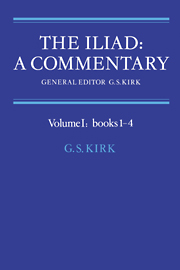Book contents
- Frontmatter
- Contents
- List of maps
- Preface
- Abbreviations
- Editorial introduction: the methods and aims of the Commentary
- INTRODUCTION
- 1 The making of the Iliad: preliminary considerations
- 2 The structural elements of Homeric verse
- 3 Aristarchus and the scholia
- 4 The first four Books of the Iliad in context
- COMMENTARY
- Index
1 - The making of the Iliad: preliminary considerations
Published online by Cambridge University Press: 05 June 2012
- Frontmatter
- Contents
- List of maps
- Preface
- Abbreviations
- Editorial introduction: the methods and aims of the Commentary
- INTRODUCTION
- 1 The making of the Iliad: preliminary considerations
- 2 The structural elements of Homeric verse
- 3 Aristarchus and the scholia
- 4 The first four Books of the Iliad in context
- COMMENTARY
- Index
Summary
No commentary on the Iliad can avoid discussing, in a preliminary way at least, the poem's author and the manner of its creation. That is all the more necessary with what will turn out to be a substantially oral composition, the text of which cannot be treated with the disregard of circumstance which is sometimes applied nowadays, as a reaction against historicism and psychologism, to the assessment of fully literate works. The difficulties of the old ‘Homeric Question’ in its traditional form are all too familiar and will not be entered into here – the systematic study of the Greek text will, indeed, help to clarify many of the remaining problems more satisfactorily than any isolated general consideration could. On the other hand the objective evidence concerning composition and date deserves summarizing; for an account of the basic facts I have sometimes drawn on my earlier book The Songs of Homer (Cambridge 1962), especially chapter 13, ‘The circumstances of Homeric composition’, as well as on ‘Objective dating criteria in Homer’, Museum Helveticum 17 (1960) 189–205, to both of which the reader is referred for supporting references. These matters occupy sections (i) and (ii) below; (iii) sets out some fundamental considerations relating to Homer's possible use of writing, and the chapter closes with a suggestion in (iv) about Greece's unusual and perhaps unique status in respect of oral poetry.
The external evidence for Homer's date and background
Antiquity knew nothing definite about the life and personality of Homer.
- Type
- Chapter
- Information
- The Iliad: A Commentary , pp. 1 - 16Publisher: Cambridge University PressPrint publication year: 1985

